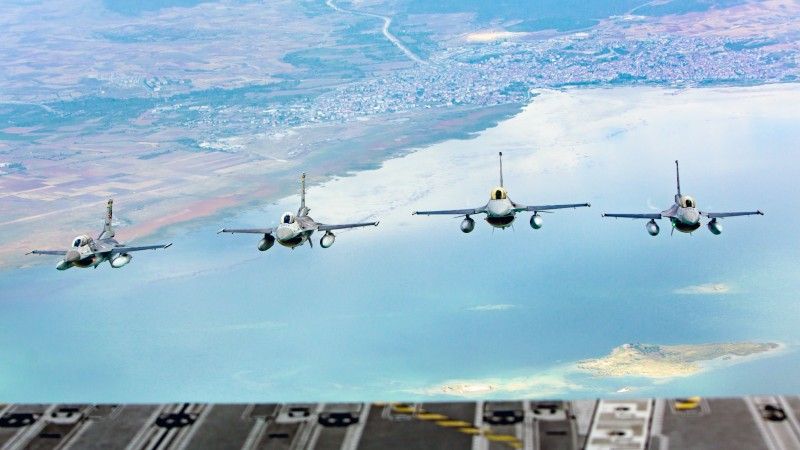Türkiye's Defense Spending to Hit Record High (Again)

Türkiye’s military investments have been on a steady rise each year, aiming to reduce reliance on foreign arms imports. Vice President Cevdet Yılmaz recently announced that Türkiye plans to allocate a record-high budget for defense and security in 2025. He also confirmed that the government will continue its growth strategy centered on the private sector
In 2025, Ankara is expected to allocate 913.9 billion lira (approximately $26.6 billion) to defense expenditures, with an additional 694.5 billion lira ($20.28 billion) for domestic security needs. When transfers to the Defense Industry Support Fund (SSDF) are included, the cumulative budget for defense and security is expected to approach 1.608 trillion lira (around $47 billion), which would constitute 10.9% of Türkiye’s total central government budget—up from 10.2% in 2024. This escalation represents a notable 17.5% increase from the 2024 defense allocation of roughly $40 billion, underscoring Türkiye’s emphasis on bolstering its defense sector.
Boosting Revenue Sources for the SSDF
Türkiye’s Defense Industry Support Fund operates under the Presidency of Defense Industries, supplying essential equipment to the Turkish Armed Forces, the Ministry of Interior, and the National Intelligence Organization. With growing demand for defense products driven by both domestic and international tensions, plans are underway to increase SSDF’s revenue sources, while alternatives for further boosting its resources continue to be explored.
One recent proposal suggested introducing an annual fee for credit card holders with limits over 100,000 lira, which would contribute 750 lira (approximately $22) yearly toward supplemental defense projects commissioned by the state. However, following substantial public resistance, the ruling Justice and Development Party (AKP) postponed the bill. Critics, including opposition leaders and policy experts, argued that this measure could breach constitutional principles, as the fee would be levied against credit availability rather than direct income, raising concerns over its legality and impact on citizens« finances.
Overall, Türkiye’s significant increase in defense spending highlights a broader objective of strengthening its national defense infrastructure and achieving greater independence in security operations, a trend that is likely to impact both domestic policy and Türkiye’s role in the global defense landscape.
What’s on the Agenda?
Ankara is increasingly concerned about the escalating conflicts in the region. Turkish Foreign Minister Hakan Fidan recently stated that Türkiye must prepare for a potential Israel-Iran war. Given the shifting geopolitical dynamics, Türkiye is committed to taking additional steps to ensure border security.
Treasury and Finance Minister Mehmet Şimşek emphasized the significance of the latest Defense Industry Presidency meeting, where plans were confirmed to build a ”Steel Dome”—an enhanced defense system—on Turkish territory. Şimşek also noted that the defense budget should be doubled, which implies substantial adjustments to the annual financial plan. This system is costly, given the advanced technology required, and its implementation will likely strain national spending, especially as the country continues to grapple with economic challenges compounded by the 2023 earthquake.
Currently, Türkiye’s defense industry is engaged in over 1,000 advanced technological projects aimed at significantly boosting national defense capabilities and increasing the export potential of domestic defense firms. Among the latest projects is a fifth-generation fighter aircraft initiative, a long-term investment for Türkiye. The critical challenge lies in developing a suitable engine for these aircraft, and investments in this sector are expected not only to be sustained but to increase further.
Türkiye’s approach to sourcing weapons externally is also noteworthy. Over the past 20 years, the country has reduced its reliance on foreign suppliers from 80% to 20%. The objective is to continue lowering this dependency by gradually expanding domestic production capacity.
Strategic Plan for the Defense Industry (2024–2028)
The 112-pageStrategic Plan for 2024–2028, prepared by Türkiye’s Defense Industry Presidency, outlines key performance indicators, a review of the current state, an assessment of the previous strategic plan’s success, and an action plan for the coming years. The report aims to convey a clear vision for both the Presidency and stakeholders within Türkiye’s defense sector. Its primary goals include expanding exports, strengthening civil-defense cooperation through dual-use technologies, and enhancing the sector’s financial framework. To boost institutional capacity, the plan introduces improvements in cybersecurity, human resources, and stakeholder communications.
The 2024–2028 Strategic Plan is structured around three primary objectives, each broken down into specific sub-goals.
Objective 1 – Ensuring Competitiveness and Sustainable Growth
- Develop strategies and initiatives to increase exports;
- Create multilateral mechanisms to support defense industry exports;
- Foster collaboration between the defense and civilian sectors for dual-use technologies;
- Reinforce the financial structure of the defense industry.
Objective 2 – Advancing Future-Shaping Technologies and Capabilities Using National Resources
- Maintain inclusive, sustainable growth of current and emerging technologies;
- Ensure development of defense products that are economically viable throughout their entire lifecycle;
- Acquire competencies in breakthrough technologies;
- Implement platform and system development projects to enhance defense and security capabilities, relying on national resources to the fullest extent possible;
- Strengthen the supply ecosystem.
Objective 3 – Developing Institutional and Sectoral Potential
- Improve the effectiveness of planning and programming by enhancing communication among stakeholders.
- Raise corporate and sectoral standards of cybersecurity and digital maturity;
- Increase awareness and maturity of digital transformation within companies and sectors;
- Foster a human-centered, values-driven approach;
- Attract more skilled professionals to the sector.
This strategic framework is designed to position Türkiye’s defense industry for sustained competitive advantage, leveraging domestic resources and enhancing its role in the global defense landscape.
Türkiye’s Proposed 2025 Budget
Vice President Cevdet Yılmaz recently presented the 2025 Budget Bill to Parliament, with a top government priority centered on reducing inflation to single digits and stabilizing it at that level, following the disinflationary trend initiated in June 2024. Türkiye’s annual inflation rate, which had reached 85% in October 2022, declined to 49.38% by September 2024, signaling progress in these efforts.
Sources of Funding
The Ministry of Finance plans to enhance spending efficiency while maintaining maximum savings, strengthen tax fairness and efficiency, and continue its gradual fight against the informal economy. Yılmaz projects that state revenue in 2025 will increase by 41.2% compared to the estimated outcome for 2024, reaching 12.8 trillion lira. Tax revenue is expected to rise by 46.5%, totaling 11.139 trillion lira. Budget expenditures in 2025 are projected at 14.731 trillion lira. The budget deficit-to-GDP ratio is targeted at approximately 3.1%.
Allocation Priorities and Structural Reforms
Planned funding will be directed across various structural reform areas, addressing priorities such as disaster recovery, green and digital transformations, inflation control, and financial stability. Further investments will support a diverse range of sectors, including high-value-added production and exports, energy and transport infrastructure, business and investment environments, as well as education, healthcare, labor market support, social security, and welfare services.

The year 2025 has the potential to be a pivotal moment for Türkiye’s defense sector, as the nation aims to achieve significant milestones, including the successful completion of the Altay tank project, the introduction of new drones, and the development of surface vessels. The newly proposed defense budget allocates $4.5 billion to bolster the domestic industry, specifically targeting research and development initiatives that are crucial for technological advancement and operational effectiveness.
Simultaneously, Türkiye is actively pursuing partnerships with other nations to secure additional financial backing for these projects. This strategic approach not only aims to mitigate the financial burden on Türkiye but also seeks to enhance collaborative efforts in defense technology development. As a result, the increased participation of Turkish defense firms in both domestic and international trade fairs reflects a broader strategy to showcase capabilities, attract investment, and establish alliances that could strengthen Türkiye’s position within the global defense market.

WIDEO: Defence24 Days 2025: Premier Defence & Security Conference in CEE